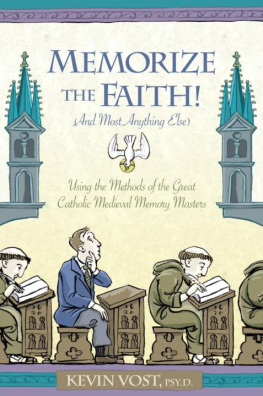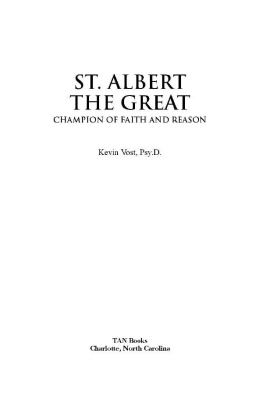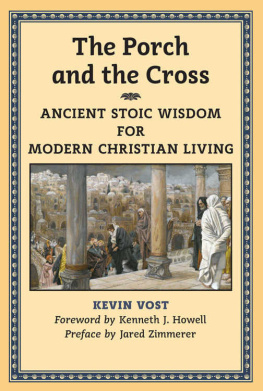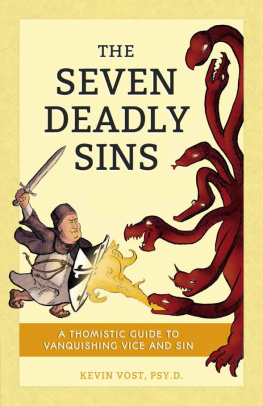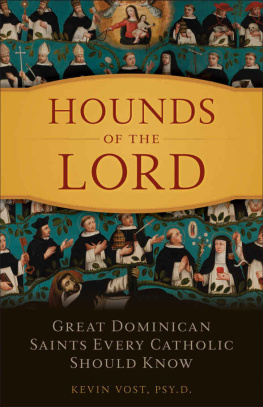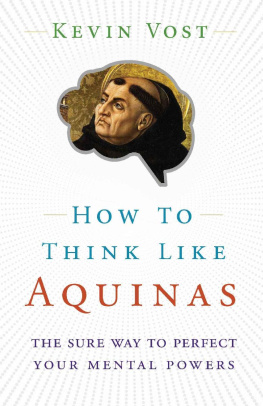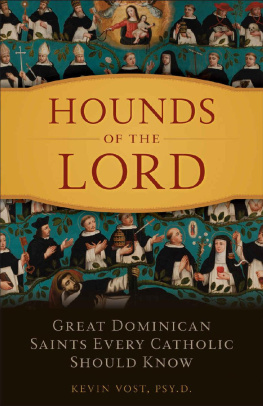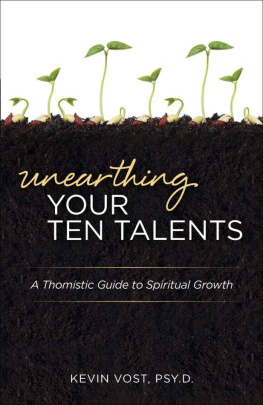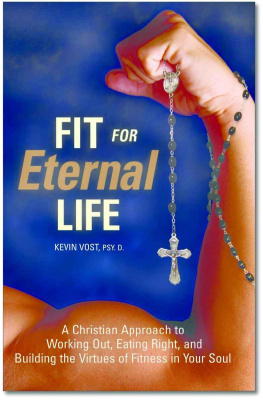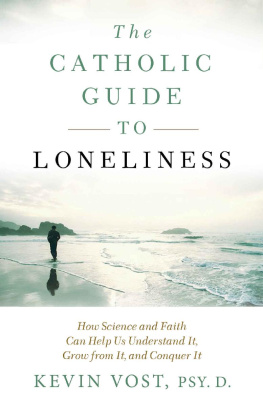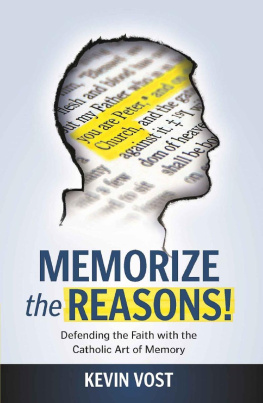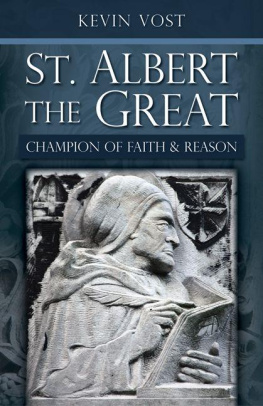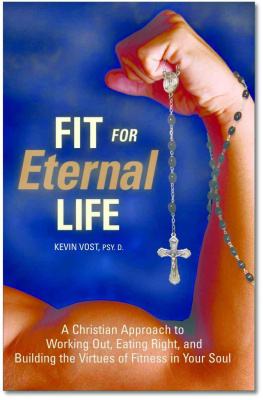(and Most Anything Else)
(and Most Anything Else)
Using the Methods of the Great Catholic Medieval Memory Masters






Marjorie Margaret (Leahy) Vost
(1925-1999):
she bore the fruits of gentleness and kindness
and to
James Henry Vost
(1926-2005),
my pillar of strength and fortitude
Notes to Readers of This Book
................. xiii
................ xvi
................. xx
.............. xx
Part 1
The Stone the Builders Rejected
................... 5
..... 21
Part 2
As for Me and My House
................. 31
.................. 35
..................... 43
.................... 49
................... 55
.......... 61
Part 3
In My Father's House Are Many Mansions
.............. 75
.................... 81
............. 85
.......... 89
........... 95
......... 101
......... 105
........... 111
................... 117
Part 4
Grow in Grace and in Knowledge of Our Lord
.......... 131
.................. 157
...... 171
.. 185
.. 193
............ 199
...... 211
Part 5
Remember What I Preach
................ 221
.... 229
......... 247
............. 249
To the many friends, colleagues, and teachers who have contributed either directly or indirectly to the creation of this book, I say thank you, for what you have taught me and for the encouragement you have provided. Although you might not be named, you are remembered (as I hope to show you when I sign your copy).
And now, for a few names.
The Dominican sisters and Viatorian priests of Springfield, Illinois, taught me respect for the intellect in my youth. Dr. Karen Kirkendall of the University of Illinois at Springfield guided my master's level work on memory and opened for me the door to university teaching. A generous mentor, she instilled in me a deep respect for developmental and cognitive psychology. Dr. Ronald E Zec of the Southern Illinois University School of Medicine guided my doctoral work and modeled unmatched passion for the neuropsychology of memory and aging. He is truly a modern master of memory. Mr. Todd Aglialoro and Dr. John Barger of Sophia Institute did so much to shape what is good in this book that I could write a book about it. The imperfections were generated from my own keyboard.
Last, but never least, I must thank Kathy, Eric, and Kyle Vost for their forbearance as I clicked away at these keys and talked so much of memory. They give me my best memories.

1 Corinthians 13:11
A NOTE TO ADULT READERS
Do you see memorization as one of those childish things you have gladly given up? Perhaps you have some less-than-pleasant memories of having to memorize things in childhood. Did you have to remember the books of the Bible in a Sunday-school program, or the fifty state capitals in fourth-grade geography? Wasn't it boring?
Perhaps you were taught a few mnemonic (memory aiding) tricks along the way - HOMES for the Great Lakes (Huron, Ontario, Michigan, Erie, Superior), or "Every Good Boy Does Fine" (EGBDF) for the lines of the treble clef. Maybe you even picked up "My Very Eccentric Mother Just Served Us Nine Pizzas" or "Man Very Early Made Jars Stand Up Nearly Perpendicular" (MVEMJSUNP) to help you remember the nine planets in their order from the sun (Mercury, Venus, Earth, Mars, Jupiter, Saturn, Uranus, Neptune, Pluto). But I'll bet it was still more drudgery than fun, right?
And you probably no longer remember most of what you learned. As effective as such techniques can be for short-term use, they're more than a little cumbersome. And anyway, most information doesn't lend itself to such simple arrangements; mnemonic techniques like those are a hodgepodge, not a formal system with wide applications.
Given the dreariness of rote memorization, and the ultimate ineffectiveness of most mnemonic tricks, I wouldn't be surprised if you've concluded that memorization is something you've given up for good.
But I'm going to try to convince you that memorization itself is not one of those childish ways. In fact, there are methods for memorization - tried and tested for thousands of years - that go far beyond the rote repetition and acronym techniques of our school days, and these techniques can be very valuable for you in your adult life. In the first part of this book, I compare these ancient memory systems to the stone that the builders rejected that later serves as the cornerstone of a great edifice. The edifice we'll build is one of knowledge and memory.
These techniques come down to us primarily from the ancient Greek poet Simonides and the philosopher Aristotle, from Marcus Tullius Cicero (hailed by some as the most profound and influential thinker of all the ancient Romans), and by two of the most sublime Doctors of the Catholic Church: St. Albert the Great (the "Universal Doctor") and St. Thomas Aquinas, the patron saint of scholars. This memory system is not kids' stuff (although children can be taught to use it), and we'll be applying it to the most relevant information imaginable: the facts, doctrines, persons, and principles of Christ's Church.
You hear a lot about the "fullness" of the Catholic Church: two thousand years of history, piety, and doctrine; of works of art, feats of heroism, and acts of charity. But how much of this fullness have you actually drunk in? This book will show how to absorb more of the Church's riches, by tapping into your underutilized powers of thought and memory. These powers were given to you by God to be used for knowing and loving him better, and the techniques in this book will help you develop them to a degree few modern souls have experienced.
The very exercise of memory techniques such as the ones in this book can also be a noble and edifying experience when their subject matter is profound. St. Albert and St. Thomas explicitly recommended the development of memory as an element of a virtuous lifestyle. The intense focus and concentration that mnemonics calls forth can help us shut out the distractions of the world and direct our attention to higher things.
Will this book really help you "memorize the Faith" as the title promises? In a qualified sense, yes. Naturally the full mystery of the Faith cannot be completely grasped and remembered using any system. In its fullness, it exceeds our understanding. God has shown us glimpses through revelation, but even the great saints see only through a glass darkly while here on earth. And to live a life of faith surely requires more than memory, or even deep knowledge, of doctrines and facts. It requires prayer and charity and a relationship with God.

